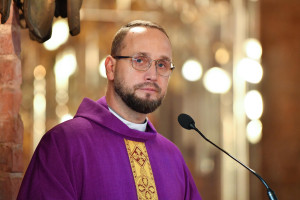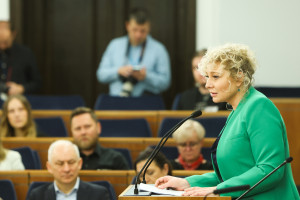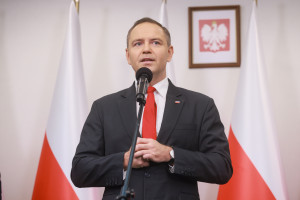"Power like Olympus" versus "teacher saving lives." A storm over psychotherapy.

- Today, each of us can call ourselves a psychotherapist – even after a few days of online training. MP Marta Golbik warns: "Today, we operate in a legal vacuum."
- Psychotherapy without medicine or psychology? Can an archaeologist, journalist, or math teacher become a psychotherapist after completing several years of training? A new bill has sparked a storm over the basic education required for candidates for the profession.
- PLN 500 per visit? Restricting access will only worsen the situation for patients, the arguments were made.
- - The statement that the profession of a psychotherapist should not be considered a medical one is peculiar, because it covers a much wider range of activities than the treatment of mental disorders - said PiS MP Czesław Hoc.
- A representative of the Civic Coalition announced "firm" support for the bill
On Wednesday, 9 July, the first reading of the government bill on the profession of psychologist and the professional self-government of psychologists (form no. 1344) and the first reading of the parliamentary bill on the profession of psychotherapist and the professional self-government (form no. 1345) took place at the plenary session of the Sejm.
During the discussion, motions were submitted to reject the bills in the first reading and to refer the bill on the psychotherapist profession exclusively to the Parliamentary Health Committee.
The second draft bill dominated the discussion. It's worth emphasizing, however, that the less controversial regulations—those concerning the psychologist profession—are intended to fundamentally change the functioning of the market for these services in Poland , ensuring that those seeking help are provided by competent and responsible professionals.
"The time for decisions is coming, the time to regulate two very important professions from the perspective of the health and safety of Polish women and men. I myself am amazed that the Polish Sejm has been unable to address these issues for so long. Three years ago, I appointed a parliamentary group whose goal was to regulate the profession of psychotherapist. Even then, many people said it was impossible to regulate it because the matter was so difficult. Meanwhile, (...) after some time of our work, the community – not all of it, but almost all of it – has consolidated. They created a working group that has been working hard for two years to develop solutions that will benefit every patient," Marta Golbik, head of the Sejm Health Committee and sponsor of the bill on the psychotherapist profession, said in the Sejm.
"These two professions must have separate laws and professional self-government bodies. Psychologists practice their profession in many key areas of public life. Clinically, including diagnosing and providing opinions, and further in education, business, sports, and transportation, where knowledge acquired through psychology studies is essential. Approximately 10% of psychologists become psychotherapists ," she enumerated.
She emphasized that psychotherapy, in turn, is a distinct field that requires years of postgraduate training, undertaken after completing various higher education programs. "According to the classification of professions and specialties, psychiatrists, psychologists, and psychotherapists are distinct professions," Golbik reminded.
She added that the draft law on the psychotherapy profession had undergone "massive public consultations." "Over 7,500 opinions and comments were received. (...) As many as 72% of respondents supported the existence of a legally separate psychotherapy profession," she said.
She emphasized that psychotherapists should become a profession of public trust. "Today, we operate in a legal vacuum. We don't have a profession of psychotherapy, we don't have a profession of public trust, and yet we expect psychotherapists to maintain confidentiality in their offices and to perform their duties with due diligence," she said.
" Each of us in this room can leave the room, call ourselves a psychotherapist and see patients, " Golbik said, pointing out that some people complete short courses, for example online, and conduct "therapy" solely on that basis.
"And—what's most incredible—the psychotherapy community has created its own standards. They've imposed regulations on themselves, within which they conduct four years of training. Very, very thorough four years of training . Standards that include 360 hours of clinical internships, in which each of these psychotherapists also learns their profession in psychiatric wards, in offices, and in appropriate centers. They themselves have imposed a system of supervision," she emphasized.
In her opinion, what parliamentarians must do now is adopt solutions that work well. "I ask the House to adopt this bill," she concluded.
Medicalization of psychotherapy or a broader perspective? This is the clue to the dispute.On behalf of the Law and Justice Parliamentary Club, MP Czesław Hoc presented his position on the draft law on the profession of psychotherapist and professional self-government.
"The lack of systemic regulation is highly inappropriate, but inappropriate legal regulations can also lead to undesirable and even dangerous issues. The fundamental issue at stake is basic education," he noted.
He pointed out that an expert in psychotherapy who "masters psychopathology, psychological interventions, interpersonal skills, differential diagnosis and diagnosis towards multimorbidity, multifaceted personality disorders and neurodevelopmental conditions" could be "a lawyer, economist, philosopher, journalist, political scientist, painter and archaeologist after a four-year course requiring 1,200 hours of training, including only 360 hours of clinical internship."
"Furthermore, they will master various psychotherapeutic approaches—psychodynamic, cognitive, behavioral, systemic, humanistic, and integrative," he enumerated. He added that "currently, as many as 95 percent of psychotherapists in Poland" have basic education in psychology, pedagogy, medicine, or related fields.
- Available data, although limited, allow us to estimate that approximately 75% of psychotherapists in Poland have a psychological education, approximately 5% have a medical education (mainly psychiatrists), and the remaining 20% are people with other education – mainly pedagogical, sociological, resocialization or humanities – said Dr. Łukasz Müldner-Nieckowski, psychotherapist, psychiatrist and sexologist, national consultant in the field of psychotherapy, in a statement to Rynek Zdrowia.
"It seems today that there is no urgent need to open up this profession so broadly. The statement that the psychotherapist's profession should not be considered medical is somewhat odd, as it encompasses a much broader scope of activities than treating mental disorders. I will also point out that the medical profession also has a holistic concept," Hoc said.
The MP also does not like the fact that the activities of the professional self-government of psychotherapists are to be supervised by the minister responsible for family, labor and social policy, "but if a psychotherapist works in the public health service, he or she is then subordinate to the Minister of Health."
He also pointed out the "exceptionally risky principle" that, according to the draft law, personality is more important than education in the work of a psychotherapist. "Then there's the problem of membership in two professional self-governments (in the case of psychotherapists who are psychologists - ed.) and a potential conflict of professional responsibility. Not to mention double dues," he enumerated. He added that the law also fails to regulate the principles of cooperation and relationships between psychotherapists and psychologists and psychiatrists.
"The National Council of Psychotherapists seems to be perched atop Mount Olympus. They practically decide on everything. Education, exams, registration, and all for a fee they choose," Hoc said.
- The Law and Justice Club will not support this form of the bill - he announced.
MP Golbik recalled that thousands of people without psychological or medical training have received certification through certification practices within associations. "There are studies indicating that there is no correlation between basic education and how effective a psychotherapist is," she stated.
She compared psychotherapy training to the ability to build houses. "After five years of training, we're not afraid to entrust (such a person - ed.) with building houses. The situation with psychotherapists is advantageous because the training process usually lasts around seven, often up to ten years, because they must complete internships and be supervised. All of this is included in the draft law. They must undergo their own therapy in order to properly manage their patients," she argued.
"No profession of public trust functions this way"On behalf of the Parliamentary Club of the Civic Coalition, the position on the parliamentary draft act on the profession of psychotherapist and professional self-government was presented in the Sejm by MP Włodzisław Giziński, a psychiatrist and psychotherapist "with over 30 years of experience".
- This act will have a fundamental and groundbreaking significance for the psychotherapy services market, because psychotherapy in Poland has been functioning in a legal vacuum for years - he said.
He pointed out that the lack of clear educational standards, uniform criteria for professional practice and supervision mechanisms mean that patients have limited opportunities to verify the competences of psychotherapists.
"The draft bill grants psychotherapists the status of a profession of public trust. (...) The ability to enforce standards on all individuals practicing psychotherapy requires tightening, which is only possible through mandatory membership in a professional self-government," he stated.
He explained that for practicing psychotherapists, this means adapting to new requirements, but also potentially greater opportunities for professional development, better legal protection, and higher social status. For patients, it means greater transparency, the ability to verify and qualify therapists, and additional mechanisms for protection in the event of irregularities.
- The Civic Coalition Club fully supports the further processing of the project - he said.
"The fact that we need a law on the psychotherapist profession is not at all debatable. What is debatable is how this law is written. Over 30 amendments are planned. I know the proposer will attempt to amend some of them," Marcelina Zawisza, MP from the Razem Party, said in the Sejm. "The question is whether this isn't a reason to slow down the pace of this bill a bit," she suggested.
"There are errors in this bill. I'll present a few of them, some obvious ones," she added.
She drew attention to "an extremely extensive list of diplomas and studies that would entitle one to enter the profession of psychotherapist." - Moreover, this list is poorly defined, because it does not include fields of study, but areas of education - she noted.
- No profession of public trust functions this way. (...) Deficiencies in, for example, a master's degree in theology or art are supposed to be compensated by a 1,200-hour combined course of therapy and clinical internship. By comparison, the minimum professional training for doctors is almost 8,000 hours of classes, internships, and postgraduate internships.
"In practice, the Act entrusts almost absolute authority over the standards of professional practice and recognition of competencies to private training centers. This represents an abdication of the state's oversight function, which is crucial for medical professions," she said.
She concluded that the bill is unacceptable in its current form. "If it doesn't achieve the correct form, we will move to reject it," she announced.
500 PLN for a visit and a life-saving teacher. "This isn't some six-month postgraduate program."The applicants' representative, MP Marta Golbik, emphasized that restricting access to the psychotherapy profession would only cause problems – "starting with fundamental issues, such as the availability of psychotherapists and the price of the services provided." "For obvious reasons, if we restrict access to the profession, (...) we will lead to a situation in which the price of psychotherapy services will also increase significantly. We don't want such a person to have to pay 500 PLN instead of 200 PLN today," she said.
In her opinion, "medical or psychological education does not prepare one to conduct psychotherapy" and "psychotherapeutic training is something completely different."
"Since we've had an unregulated profession for decades, and there were no obstacles to this famous archaeologist training to become a psychotherapist, I don't understand why this would suddenly change," Golbik said. She also expressed doubt that geologists and archaeologists would suddenly and en masse study to become psychotherapists.
- However, I can imagine a situation in which a mathematics teacher, who is not currently included in this act, who has been teaching his students for 15 years and talks to them on a daily basis, will be banned from attending 5 years of psychotherapeutic training - she pointed out.
As she noted, young people often say that their lives were saved by a teacher - "not always a teacher, not always a school counselor."
"There are lawyers who excel as psychotherapists because at some point in their lives, perhaps influenced by many years of helping injured parties, they decided they would love to pursue this professionally, that they are good listeners, that they want to help people. Such a lawyer should also have the right to attend training. I emphasize that a five-year training is not some six-month postgraduate program," Golbik concluded.
Copyrighted material - reprint rules are specified in the regulations .
rynekzdrowia
















